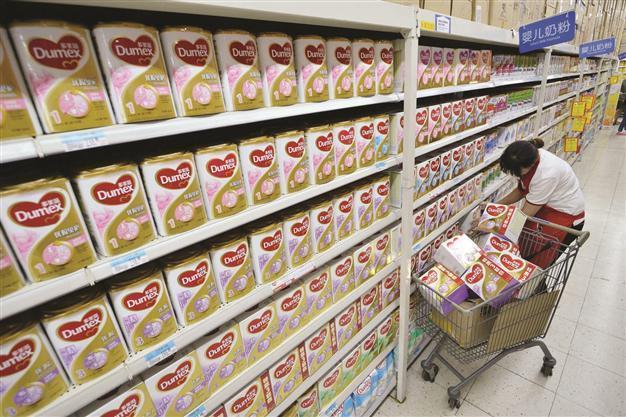China milk powder crackdown tough for sector players
SHANGHAI - Reuters

This file photo shows a sales assistant taking down milk powder products from shelves at a supermarket in Taiyuan, Shanxi province. REUTERS photo
A crackdown on corruption in China’s infant milk formula sector has made sales representatives and hospital doctors fearful of talking to each other, putting a brake on marketing and possibly hitting revenue growth for foreign firms.
Chinese media have repeatedly accused foreign milk powder makers, notably France’s Danone SA, of paying bribes to medical staff in return for recommending their brands to new and expectant mothers.
The French food maker said this week iChinese media have repeatedly accused foreign milk powder makers, notably France’s Danone SA, of paying bribes to medical staff in return for recommending their brands to new and expectant mothers.
China is a magnet for foreign infant milk formula makers, with the $12.4 billion market expected to double by 2017. But investigations by Chinese authorities and reports in state media, often quoting whistleblowers, have curtailed marketing activity at hospitals.
“Since the ‘First Drop of Milk’ expose, no matter what brand of milk powder, none of the reps have been coming,” said a nurse at a top Shanghai hospital.
Bribe claimsThe nurse, who declined to be identified, was referring to a recent report by official China Central Television (CCTV) that claimed milk powder firms were bribing doctors to recommend their brands as the first milk substitute a baby tastes.
While hospitals only account for 3 percent of overall infant formula sales in China, they are key for companies trying to get parents to buy their brand, according to a Chinese research firm, Beijing Shennong Kexin Agribusiness Consulting.
“A doctor’s recommendation has the biggest impact,” the firm said in a recent report. “Once a patient has chosen a product, the likelihood of them changing to another brand is very small.”
Much of the scrutiny has been on Danone. Besides Dumex, its Nutricia advanced nutrition unit has also been accused in state media of bribing doctors to boost milk formula sales. Danone has said it was investigating that report.
Danone’s woes in China are likely to feature when it announces third-quarter results today.
It’s unclear how much China will account for this reversal. But China is an important market for Danone’s baby food division, which accounts for 20 percent of group sales, making it the No. 2 contributor after dairy.
Corruption in China’s medical sector is widespread, fuelled in part by low base salaries for doctors and nurses at the country’s 13,500 public hospitals.
Milk powder is also a sensitive topic since a 2008 scandal involving milk tainted with the industrial chemical melamine killed at least six infants and left thousands more ill.
This damaged the reputation of local firms and boosted the market share of foreign brands, which now account for close to 80 percent of the infant formula market in major cities, according to data from Rabobank. In September, the Health Ministry warned doctors against taking bribes from milk powder sales staff.
